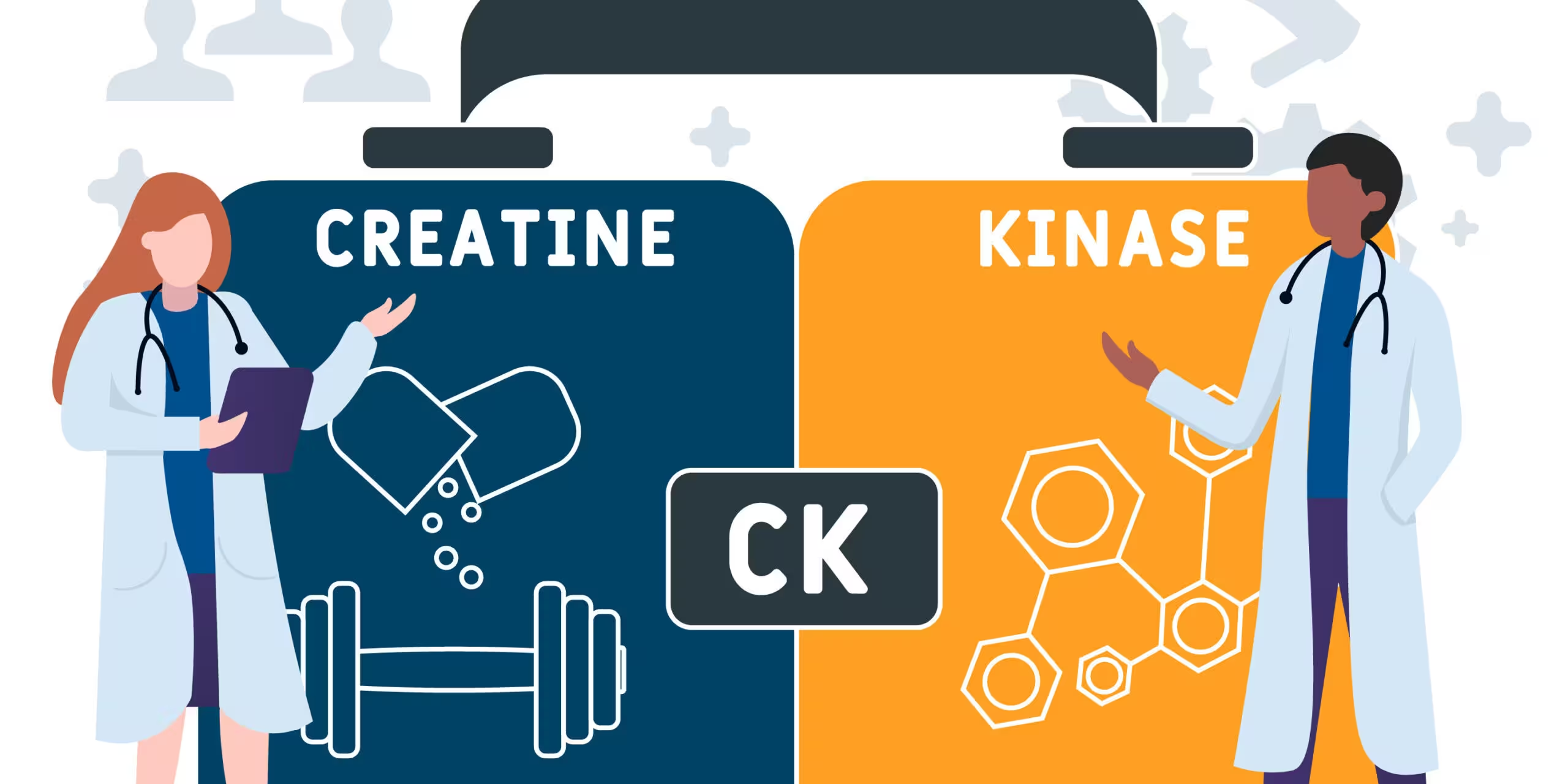Creatine kinase (CK) is an essential enzyme found in the muscles, heart, and brain that plays a critical role in energy production, particularly in the form of ATP (adenosine triphosphate), the main energy source for muscle contractions. Creatine kinase is produced when muscle fibers are damaged, and measuring its levels in the blood can help assess various health conditions, from muscle injury to more serious diseases like heart attacks or muscular dystrophy. In this article, we will explore creatine kinase, how it’s tested, its significance in different health conditions, and its relation to fitness and supplementation.
What is Creatine Kinase?
Creatine kinase is an enzyme that catalyzes the conversion of creatine into phosphocreatine, which is a storage form of energy used by muscle cells. It exists in three primary forms, each associated with specific tissue types:
- CK-MM (Muscle Type) – Found predominantly in skeletal muscles.
- CK-MB (Heart Type) – Found in the heart muscle and released when there is damage to heart tissue.
- CK-BB (Brain Type) – Found primarily in the brain and smooth muscles.
When muscles are injured or stressed, creatine kinase leaks from the cells into the bloodstream. Therefore, measuring CK levels can provide valuable diagnostic information about the extent of muscle damage or tissue injury.
The Role of Creatine Kinase in the Body
Creatine kinase is vital for energy production. It aids in the regeneration of ATP, which muscles need for contraction. Muscles store phosphocreatine, which is a high-energy compound. When muscles contract, phosphocreatine donates its phosphate group to ADP (adenosine diphosphate) to regenerate ATP, the molecule that powers muscle contractions. Creatine kinase catalyzes this process.
The three different forms of CK have distinct roles:
- CK-MM: The most abundant form in skeletal muscle, CK-MM levels rise when there is damage or strain to skeletal muscle tissue. This could occur during intense physical activity, trauma, or conditions such as rhabdomyolysis.
- CK-MB: Predominantly found in cardiac muscle, elevated CK-MB levels in the blood are often associated with heart attacks or other cardiac events. A spike in CK-MB levels is typically one of the markers doctors look for to diagnose acute myocardial infarctions (heart attacks).
- CK-BB: This form of CK is predominantly found in the brain and smooth muscle, and although it’s rarely measured in routine testing, elevated levels may suggest brain or neurogenic issues.
Why is Creatine Kinase Tested?
Creatine kinase testing is commonly used in clinical medicine to evaluate muscle and heart conditions. Here are some of the main reasons CK testing is performed:
- Muscle Injury: Creatine kinase levels can rise after a workout, particularly with intense physical exertion or weightlifting. It is a useful marker to evaluate muscle injury or muscle stress. Conditions like rhabdomyolysis, a severe muscle breakdown disorder, show dramatically elevated CK levels.
- Heart Attack Diagnosis: Elevated CK-MB levels are significant in diagnosing heart attacks. CK-MB levels rise in the blood when heart muscle cells are damaged due to ischemia (lack of oxygen to the heart muscle). Blood tests for CK-MB are often performed alongside other biomarkers such as troponin to assess cardiac injury.
- Muscular Diseases: Conditions such as muscular dystrophy or myositis may lead to elevated CK levels as the muscles progressively weaken or undergo inflammation. Chronic elevation of CK in the bloodstream could point to muscle disorders.
- Exercise and Performance Monitoring: Athletes often monitor CK levels as an indirect measure of recovery after strenuous physical activity. Elevated CK levels post-exercise indicate muscle strain, and tracking these levels helps athletes gauge their training intensity and recovery time.
- Kidney Function: Extremely high levels of CK (especially in the case of rhabdomyolysis) can overwhelm the kidneys and cause renal failure. Thus, CK tests can also help assess the risk of kidney damage.
Understanding Creatine Kinase Test Results
Creatine kinase levels are measured in units per liter (U/L) of blood. Normal ranges vary depending on factors like age, sex, and the method used by the testing laboratory. In general:
- Normal CK levels:
- Men: 52-336 U/L
- Women: 38-176 U/L
When the CK level exceeds the normal range, it may indicate muscle damage or other health issues. However, it is important to note that CK levels can be influenced by a variety of factors, including:
- Physical Activity: Intense exercise, particularly activities that involve eccentric muscle contractions (e.g., downhill running, weightlifting), can cause an increase in CK levels, often within the first 24–48 hours after the activity.
- Muscle Mass: Individuals with more muscle mass, such as athletes, may naturally have higher baseline CK levels compared to sedentary individuals.
- Medications: Certain medications, including statins (used to treat high cholesterol), can cause muscle damage and result in elevated CK levels.
- Muscle Disease or Injury: Chronic conditions like muscular dystrophy or acute injuries, such as strains and sprains, can cause CK levels to rise.
- Heart Conditions: Elevated CK-MB levels in the presence of chest pain or other cardiac symptoms can point to heart attack or myocardial injury.
How is Creatine Kinase Tested?
A CK test is a simple blood test that involves drawing a sample from a vein in your arm. The blood is then sent to a lab where CK levels are measured. If you’re undergoing the test to assess muscle injury or heart damage, your doctor might request additional tests (such as troponin levels or an EKG) to confirm or rule out specific diagnoses.
- Creatine Kinase (Total): This test measures the total amount of CK in your blood, including all three forms (CK-MM, CK-MB, and CK-BB). It is commonly used to detect overall muscle damage or injury.
- CK-MB: This test specifically measures CK-MB levels and is more useful for evaluating cardiac muscle injury.
- CK-MM: This test focuses specifically on skeletal muscle injury and can be useful in diagnosing muscle conditions like rhabdomyolysis.
Supplementation and Creatine Kinase
While creatine kinase testing is often associated with muscle health and injury, it’s important to note that creatine supplementation does not typically raise CK levels significantly under normal use. Creatine is a naturally occurring compound that helps with ATP regeneration in muscles. For individuals engaging in regular exercise, creatine supplementation can improve strength, enhance exercise performance, and support muscle recovery, but it should not cause an abnormal rise in CK levels unless there is an underlying issue, such as a muscle injury.
Recommended Creatine Supplements
While creatine supplementation may not directly affect CK levels, it can help improve muscle recovery and performance. Here are three reputable creatine supplement brands you might want to consider:
1. Bulk Natural Pure Creatine Monohydrate
Bulk Natural Pure Creatine Monohydrate is a top-tier creatine supplement offering 100% pure creatine monohydrate with no additives or fillers. It’s one of the most popular and cost-effective creatine supplements available. This type of creatine is extensively studied and proven to increase strength, endurance, and muscle mass over time. With Bulk’s reputation for high-quality products, it ensures you’re getting the purest form of creatine.
- Pros: 100% creatine monohydrate, free from artificial additives, vegan-friendly, and supports strength and endurance.
- Cons: Some people may experience mild bloating with creatine monohydrate.
2. Klean Creatine by Klean Athlete
Klean Creatine is another excellent choice for athletes looking for a high-quality creatine supplement. It contains Creapure®, a branded form of creatine monohydrate that’s known for its purity and effectiveness. This supplement is NSF Certified for Sport, which means it’s free from banned substances and contaminants, making it a great option for athletes in competitive sports.
- Pros: High-quality Creapure® creatine, NSF Certified for Sport, non-GMO, free of artificial colors and flavors.
- Cons: A bit pricier compared to regular creatine monohydrate supplements.
3. Transparent Labs Creatine HMB
Transparent Labs Creatine HMB is a unique supplement that combines creatine monohydrate with HMB (beta-hydroxy-beta-methylbutyrate). HMB is a metabolite of leucine, an amino acid that helps prevent muscle breakdown. By combining creatine with HMB, this supplement supports not just strength and performance but also recovery and muscle preservation, making it ideal for those undergoing intense training or in calorie deficit.
- Pros: Contains both creatine and HMB for improved muscle preservation, no artificial additives, and free from harmful chemicals.
- Cons: More expensive than standard creatine monohydrate supplements.
Conclusion
Creatine kinase plays a significant role in muscle function and energy metabolism. By measuring CK levels through blood tests, doctors can assess muscle injury, cardiac events, and other health conditions. Elevated CK levels can be indicative of muscle damage, heart attacks, or muscular diseases. Supplementation with creatine has been shown to support muscle performance and recovery, and several top brands, such as Bulk Natural, Klean Athlete, and Transparent Labs, offer high-quality creatine supplements that may benefit those seeking to improve their athletic performance. However, it’s crucial to remember that while creatine supplementation supports muscle recovery, it should be used responsibly, alongside adequate training and nutrition.



